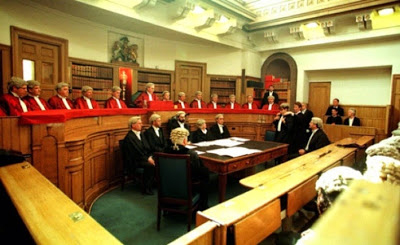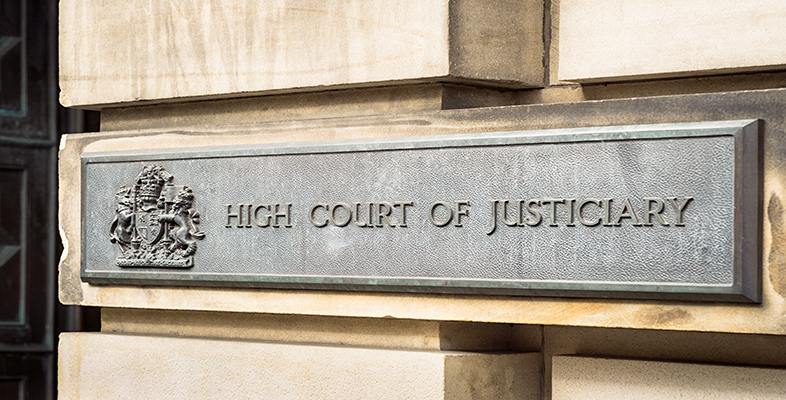4.1 The judiciary
Judges play an important role in society and when they are appointed they swear an oath to ‘do right to all manner of persons without fear or favour, affection or ill will’. Read the information below on the role of judges taken from the judiciary of Scotland website [Tip: hold Ctrl and click a link to open it in a new tab. (Hide tip)] .
Box 4 Judicial independence
Much has been written about judicial independence both in its institutional and individual aspects. Judicial independence is not the private right of judges, but the foundation of judicial impartiality and is for the benefit of the public. It is a cornerstone of our system of government in a democratic society and a safeguard of the freedom and rights of the citizen under the rule of law.
Independence of the judiciary refers to the necessary individual and collective or institutional independence required for impartial decisions and decision making. Judicial independence thus characterises both a state of mind and a set of institutional and operational arrangements. The former is concerned with the judge’s impartiality in fact; the latter with defining the relationships between the judiciary and others, particularly the other branches of government.
For centuries, the independence of judges has been protected in several ways:
- judges are independent of the executive and the legislature and do not get involved in political debate;
- full time salaried judges cannot be removed from office without a motion passed or approval by the Scottish Parliament; and
- judges are almost entirely immune from the risk of being sued or prosecuted for what they do in their capacity as a judge.
The essentials of judicial independence are impartiality, integrity and freedom from interference. Independence is secured in part by the restrictions on removal from office and the immunity from being sued or prosecuted.
Principle of separation
In order for the decisions of the judiciary to be respected and obeyed, the judiciary must be impartial. To be impartial, the judiciary must be independent. To be independent, the judiciary must be free from interference, influence or pressure. For that, it must be separate from the other branches of the State or any other body. As far back as 1599, the Lord President of the Court of Session declared to James VI that the judges were independent of the King “sworn to do justice according to our conscience”. The principle of the separation of powers of the State requires that the judiciary, whether viewed as an entity or in its individual membership, must be, and be seen to be, independent of the executive and legislative branches of government. The relationship between the judiciary and the other branches should be one of mutual respect, each recognising the proper role of the others. The Judiciary and Courts (Scotland (Act) 2008) enshrines judicial independence in law. It introduces a duty on Scottish Ministers, the Lord Advocate and members of the Scottish Parliament to uphold the continued independence of the judiciary, barring them from trying to influence the judiciary through any special access to judges.
Judicial independence is important for a fair trial, for adjudication of disputes, for respect for decisions and because the judges may have to decide disputes between the executive, the legislature and an individual or the public at large.
Our legal system
Our legal system is based on the principle that an independent, fair and competent judiciary will interpret and apply the laws that govern us. A judge’s role is to make a decision between parties in a legal dispute, based on the facts of the case and the law that applies to the facts. The parties must accept the judge’s decision as final, unless one of them appeals the judge’s decision to a higher court.
Judicial decision making
Judicial independence is not only a matter of appropriate external and operational arrangements. It is also a matter of independent and impartial decision making by each and every judge. The judge’s duty is to apply the law as he or she understands it without fear or favour and without regard to whether the decision is popular or not. This is a cornerstone of the rule of law. Judges individually and collectively should protect, encourage and defend judicial independence. Judicial independence means that judges are not subject to pressure and influence, and are free to make good decisions based solely on fact and law.
Judicial oath
When judges are sworn in they take two oaths or affirmations. The first is the oath of allegiance and the second the judicial oath, these are collectively referred to as the judicial oath.
The judicial oath provides:
‘I will do right to all manner of people after the laws and usages of this Realm, without fear or favour, affection or ill-will.’
In taking that oath, the judge has acknowledged that he or she is primarily accountable to the law which he or she must administer. Judges themselves have to be vigilant to identify and resist any attack upon that independence, by whomsoever or by whatever means. The oath plainly involves a requirement to be alert to, and wary of, subtle and sometimes not so subtle attempts to influence judges or to curry favour. Moreover, a judge should be immune to the effects of publicity, whether favourable or unfavourable. That does not mean, however, being immune to an awareness of the profound effect that judicial decisions may have, not only upon the lives of people before the court, but sometimes upon issues of great concern to the public in general.
How long can a judge remain a judge?
Once a judge is appointed, he or she is eligible to be a judge until the age of retirement. The statutory retirement age is set by the Judicial Pensions and Retirement Act 1993, which came into force on 31 March 1995. All judges appointed to full-time judicial office after the Act came into force must retire from office at the age of 70.
A full time salaried judge may be removed from office only if unfit for office by reason of inability, neglect of duty or misbehaviour. A judge of the Supreme Courts of Scotland may be removed from office only by Her Majesty on a recommendation made by the First Minister. The First Minister may make such a recommendation if (and only if) the Scottish Parliament, on a motion made by the First Minister, resolves that such a recommendation should be made. The First Minister can make such a motion to the Scottish Parliament only if a tribunal, constituted in terms of section 35 of the Judiciary and Courts (Scotland) Act 2008, has provided the First Minister with a written report concluding that the judge in question is unfit and giving reasons for that conclusion. A sheriff may be removed from office only if a tribunal constituted under section 12A of the Sheriff Courts (Scotland) Act 1971 has provided the First Minister with a written report concluding that the sheriff is unfit and giving reasons. The First Minister must lay the report before the Scottish Parliament and may lay a statutory instrument before Parliament for the removal of the sheriff. Parliament may resolve not to allow the removal to take effect.

As part of the principle of judicial independence judges are not able to hear cases where there is a potential conflict of interests. A judge must step down in circumstances where there appears to be bias or ‘apparent bias’. The test for determining apparent bias is this: if a fair-minded and informed observer, having considered the facts, would conclude that there was a real possibility that the judge was biased, the judge must recuse themselves. You may not have come across the verb ‘to recuse’ before. It is used solely in legal situations, and means that those with judicial authority remove themselves from a case or proceeding to avoid a potential conflict of interest.
The process of recusal is important as the judiciary must ensure that they remain independent and that they are also seen to be independent of any influence that might reasonably be perceived as compromising their ability to judge cases fairly and impartially. This is an integral part of the saying ‘justice must not only be done but be seen to be done’.
Judicial recusal is not a matter of discretion and in Scotland, since February 2014, a list of judicial recusals has been published on the website of the Judiciary of Scotland. These have included being personally known to a witness, a Sheriff previously presiding over a related case and a pursuer being known to the Sheriff.
| Date | Court (type of action) | Name | Reason for Recusal |
| 26/01/2016 | Court of Session | Lord Uist | Judge dealt with same issue and same witnesses in a case being appealed |
| 27/01/2016 | Dumbarton Sheriff Court (civil) | Sheriff Gallacher | On the Pursuer's motion in relation to a decision in a preliminary hearing |
| 09/02/2016 | Elgin Sheriff Court (criminal) | Sheriff Pasportnikov | Sheriff previously presided over related case |
| 10/02/2016 | Elgin Sheriff Court (criminal) | Sheriff Pasportnikov | Sheriff previously presided over criminal matter involving complainter |
| 24/02/2016 | Glasgow Sheriff Court (civil) | Sheriff Reid | Sheriff personally known to a witness |
| 18/03/2106 | Edinburgh Sheriff Court (civil) | Sheriff Ross | Sheriff previously presided over criminal matter involving appellant |
| 18/03/2016 | Aberdeen Sherirff Court (criminal) | Sheriff Stirling | Sheriff previously presided over civil matter involving accused |
| 25/04/2016 | Ayr Sheriff Court (civil) | Sheriff Montgomery | Sheriff previously acted for defender as a solicitor |
| 03/05/2016 | Lanark Sheriff Court (criminal) | Sheriff Stewart | Complainer previously represented by Sheriff's husband |
| 22/06/2016 | Perth Sheriff Court (civil) | Sheriff Clapham | Pursuer known to Sheriff |
| 09/08/2016 | Dunoon Sheriff Court (civil) | Sheriff Ward | Sheriff personally known to a witness |
| 19/08/2016 | Greenock Sheriff Court (criminal) | Sheriff Ward | Accused known to Sheriff from Sheriff's time in private practice |
